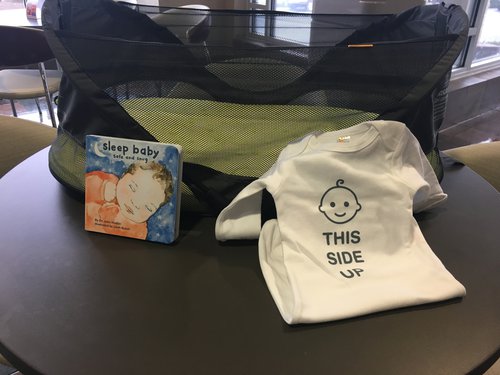COVINGTON, Ga. - “If I never had to work a child death, or infant death, related to a sleep environment again, it would be fantastic,” Newton County Coroner Tommy Davis said.
Three tips to avoid a sleep-related infant death
- Have the infant sleep on its back
- Share a room, not a bed
- Make sure there is nothing around the baby as it is sleeping
Davis said sleep-related infant deaths are a national problem and through a state grant, Piedmont Newton Hospital is able to offer Mothers with Medicaid or without insurance bassinets and resources to aid in a safe sleep plan in an effort to prevent a sleep-related infant death.
Missy Braden, First Steps Program coordinator at Piedmont Newton, said in 2016, the state of Georgia averaged three sleep-related infant deaths a week.

“It’s tragic events,” Davis said. “When we get there, these children, these infants, are in the bed typically with mom or with mom and dad and the babies can easily get wedged up next to a parent and the parent doesn’t realize it and neither does the infant.
“Most times that’s the problem we’re finding. They’re in an adult sleeping environment; the baby is in that sleeping environment with them. These children are days, weeks or months old and no matter what a parent thinks, they’re not used to that child being in their sleep environment and their child is not used to being in their sleep environment.”
Piedmont Newton is in its third year providing bassinets to mothers, Braden said. It will likely go away in the future.
“The preliminary information that they got is that it is making moms much more aware of the choices that they’re making and the fact that it is very readily available place for their baby to sleep does seem to be helping,” she said. “We don’t have any hard and fast numbers right now.”
Piedmont Newton is considered a “Georgia Safe to Sleep Hospital” through the Georgia Department of Public Health. In addition to the bassinets, mothers receive a copy of the “Sleep Baby, Safe and Snug” book and a gown highlighting the proper position to lay a baby.
Each mom is also informed ofthe “ABCs of safe sleep,” which encourages the following:
Alone: Babies should sleep alone in their own sleep space, close to, but separate from their caregiver. Parents and caregivers are encouraged to share a room with the baby, but avoid sleeping in the same bed with the infant.
Back: Babies should be placed on their back to sleep. Studies show that placing infants on their back for all sleep times, including naps and at night, reduces the risk of SIDS.
Crib: Babies should sleep in a crib or bassinet that meets standards set forth by the Consumer Products Safety Commission. The mattress should be firm and covered with a tight-fitting bottom sheet made specifically for the crib. No blankets, quilts, crib bumpers, toys or any objects should be in the baby’s sleeping space.
“You’re going to have infant death, just like you’re going to have adult death. There are things we can’t prevent, like SIDS and SUIDS, natural disease processes, children who are born with chronic problems or congenital defects, those deaths are unfortunately expected,” Davis said. “These deaths that we’re working related to co-sleeping are typically children that are in very good health, came through a good pregnancy, a good delivery and are growing at a normal rate and doing everything normal and because of a sleep environment; a lot of times we’re finding this to be the case.”
Braden said it is important to involve the whole family in safe sleep education for new babies.
“The baby’s exhausted, the mother’s exhausted, the whole family is – anybody that’s in that house – because it’s such a change, even though they’ve gone through nine months of pregnancy preparing themselves, they’ve gone through nine months of pregnancy exhausted too,” Davis said. “They’re just tired, you know.”
In 2015, the state’s Child Fatality Review Program reviewed 120 deaths, 61 of which were determined to be sleep-related.
“The numbers that we see here (in Newton County) are not tremendous, because our child deaths are not a tremendous number, but one is too many,” Davis said.





